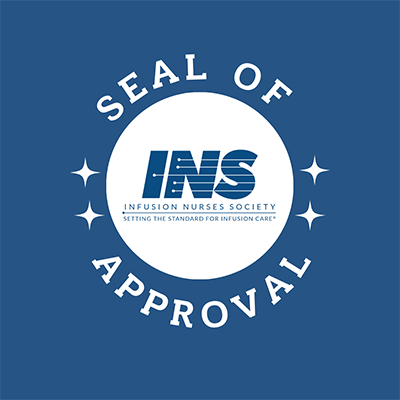- Magnet Recognition Program Hospital Recognition
- Pathway to Excellence Hospital Recognition
- Journey to Magnet Excellence
- Journey to Pathway to Excellence
- Practice Transition Accreditation Program
- National League for Nursing Center of Excellence in Nursing Education
- The Society for Simulation in Healthcare
- Infusion Nurses Society Seal of Approval
Magnet Recognition Program Hospital Recognition
The American Nurses Credentialing Center, a subsidiary of the American Nurses Association and the largest and most prominent nursing credentialing organization in the United States, established the ANCC Magnet Recognition Program® in 1994. Research has shown that patient care outcomes are better at Magnet hospitals, where there is an environment that empowers nurses, values their contributions and supports nursing leadership. Magnet status is awarded for a four-year period, after which hospitals must apply again for the recognition.
Who we are
Cleveland Clinic is recognized in the U.S. and throughout the world for its expertise and care. As part of The Stanley Shalom Zielony Institute for Nursing Excellence, our nurses support the organization's mission, vision and values while utilizing the Zielony Professional Practice Model to meet the needs of our patient population. Twelve hospitals within Cleveland Clinic have achieved Magnet status.
- Cleveland Clinic Abu Dhabi | Designated in 2019 | Redesignated in 2024
- Cleveland Clinic Main Campus | Designated in 2003 | Redesignated in 2008, 2013, 2018, 2023
- Cleveland Clinic Akron General | Designated in 2013 | Redesignated in 2018, 2023
- Avon Hospital | Designated in 2022
- Euclid Hospital | Designated in 2022
- Fairview Hospital | Designated in 2009 | Redesignated in 2013, 2019, 2023
- Hillcrest Hospital | Designated in 2014 | Redesignated in 2019, 2024
- Lutheran Hospital | Designated in 2021
- Marymount Hospital | Designated in 2021 | Redesignated in 2025
- Medina Hospital | Designated in 2023
- South Pointe Hospital | Designated in 2017 | Redesignated in 2022
- Weston Hospital | Designated in 2024
The recognition process involves the review of hundreds of pages of documentation, and a four to five-day site visit by ANCC professionals who evaluate Cleveland Clinic against more than 65 stringent quantitative and qualitative standards that epitomize excellence in nursing services, clinical outcomes and patient care delivery. Cleveland Clinic must continue to pass bi-annual reviews as part of its four-year designation.
What does it take to achieve Magnet Status?
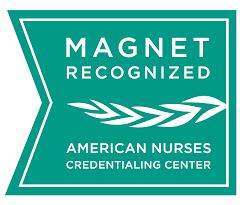
Magnet hospitals exemplify the 14 forces of magnetism established by the American Nurses Credentialing Center by demonstrating:
- A high-quality care environment
- Clinical autonomy and responsibility
- Participatory decision-making
- Strong nurse leaders
- Two-way communication with staff
- Community involvement
- Opportunity and encouragement for professional development
- Effective use of staff and resources
- High levels of job satisfaction (directly affects patient satisfaction)
Magnet Status is the highest national recognition awarded to a hospital or medical center for excellence in nursing. It is accepted nationally as the gold standard of patient care and provides healthcare consumers with a benchmark to measure quality of nursing care.
What does Magnet Status mean?
The Difference in Being a Magnet Hospital
Independent research shows that Magnet facilities consistently outperform non-Magnet facilities by demonstrating:
For Patients
- Lower mortality rates
- Shorter lengths of stay
- Increased stability in care and positive outcomes
- Increased satisfaction and confidence levels
For Nurses
- Higher rates of job satisfaction
- More appropriate RN mix
- Better delivery of quality care
- Autonomy in clinical practice
- Lower incidence of needlestick injury
For Hospitals
- Increased retention and recruitment of nurses
- Collaborative work environment
- Lower rates of staff nurse turnover
- Increased attraction of high-caliber nurses, physicians and specialists
Pathway to Excellence Hospital Recognition
Pathway to Excellence Program®
The ANCC Pathway to Excellence Program® designation from the American Nurses Credentialing Center (ANCC) is earned by healthcare organizations that create a positive nursing practice environment where nurses’ needs are supported and high clinical standards are promoted. Pathway to Excellence® status is bestowed for a four-year period, after which hospitals must apply again for the recognition.
The following hospitals within Cleveland Clinic’s enterprise are Pathway to Excellence® designated:
- Cleveland Clinic Indian River Hospital | Designated in 2025
- Cleveland Clinic Lodi Hospital | Designated in 2024
- Cleveland Clinic London | Designated in 2025
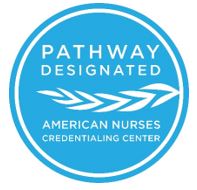
What does Pathway to Excellence designation mean?
Our Pathway to Excellence designated hospitals are committed to sustaining a culture of excellence and providing the foundation of a healthy workplace for nursing caregivers.
The ANCC Pathway to Excellence framework depicts the six standards that are essential elements in developing a positive practice environment for nurses. Our nurses are committed to Living Pathway ~ embodying the Pathway Standards through the work they do every day, by:
- Shared Decision-Making creates opportunities for direct care nurses to network, collaborate, share ideas and be involved in decision-making.
- Leadership supports a shared governance environment by ensuring that leaders are accessible and that they facilitate collaborative decision-making. This standard also emphasizes leadership development, orientation, retention, accountability and succession planning.
- Safety prioritizes both patient and nurse safety, and fosters a respectful workplace culture free of incivility, bullying and violence.
- Quality is central to an organization's mission, vision, goals, and values, and is based on person- and family-centered care, evidence-based care, continuous improvement and improving population health.
- Well-Being promotes a workplace culture of recognition for the contribution of nurses and the healthcare provider team. Additionally, this standard provides staff with support and resources to promote their physical and mental health.
- Professional Development ensures that nurses are competent to provide care and provides them with mentoring, support and opportunities for lifelong learning.
We will continue to deliver on our Pathway promise to create a healthy work environment where nurses excel and feel empowered as an integral part of the team. Our organization’s investment in our nursing leadership, policies and safety means better quality care from our nurses and better outcomes for our patients.
What does it take to achieve Journey to Pathway to Excellence designation?
An organization earns Pathway to Excellence designation through a review process where nurses at all levels conduct a self-assessment and fully document how the Pathway Practice Standards are active in their practices, policies and culture. The organization must be compliant with all state and/or federal laws as they relate to registered nurses in the workplace and have a CNO/DON, who holds a BSN or higher degree in nursing, in place at the time of application.
Journey to Magnet Excellence
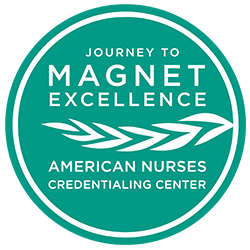
What does the Journey to Magnet Excellence® mean?
Hospitals seeking to create and sustain a culture of excellence may embark on the Journey to Magnet Excellence®. The process involves a self-assessment of the organization’s performance against the Magnet® sources of evidence. During the process between self-assessment and site visit, the hospital has an opportunity to transform and embed their culture with the principles of nursing excellence.
The following Cleveland Clinic hospital(s) is on the Journey to Magnet Excellence:
What does it take to achieve Journey to Magnet Excellence?
To achieve initial Magnet recognition, organizations must pass a rigorous and lengthy process that demands widespread participation from leadership and staff. The process begins with the submission of an electronic application, followed by written documentation demonstrating qualitative and quantitative evidence regarding patient care and outcomes. If scores from the written documentation fall within a range of excellence, an on-site visit will occur to thoroughly assess the applicant. After this rigorous onsite review process, the Commission on Magnet® will review the completed appraisal report and vote to determine whether Magnet recognition will be granted.
Journey to Pathway to Excellence
The American Nurses Credentialing Center's (ANCC) Journey to Pathway to Excellence® status is given to healthcare organizations that create work environments where nurses can excel in their practice. The status substantiates the professional satisfaction of nurses and identifies best places to work.
The following hospitals within Cleveland Clinic are on the Journey to Pathway to Excellence®:
What does Journey to Pathway to Excellence® mean?
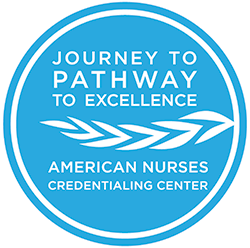
A Journey to Pathway to Excellence® organization is committed to nurses and to what nurses identify as a match with their values and contributions toward the overall pursuit of safe, quality patient care. This designation confirms to the public that nurses working in a Journey to Pathway to Excellence® organization know that their efforts are supported and invite other nurses to join their colleagues in this desirable and nurturing environment.
What does it take to achieve Journey to Pathway to Excellence®?
An organization earns the Journey to Pathway to Excellence® status through a review process where it fully documents that the Practice Standards of the ideal practice environment are present in the organization's practices, policies, and culture. The Practice Standards are based upon expert nurse input and nursing literature that supports the qualities of a positive practice environment. After successful document review, nurses in the organization verify the presence of the Practice Standards in the organization through participation in a confidential online survey.
Practice Transition Accreditation Program
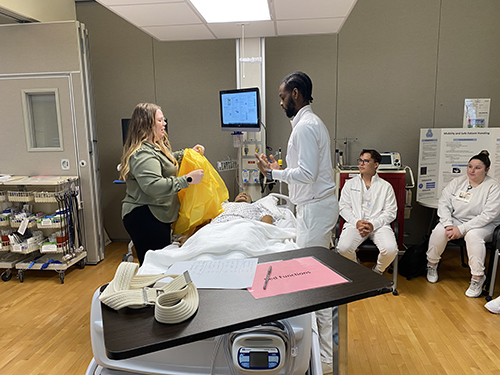
Residency programs are structured, extensive training periods designed for registered nurses (RNs) as they transition into their first nursing job. They help to develop the knowledge, skills, abilities and clinical judgment necessary to provide safe, high-quality care in their specialized field.
Cleveland Clinic’s Nurse Residency Program is proud to be accredited as a Practice Transition Program (PTAP) by the American Nurses Credentialing Center’s Commission on Accreditation in Practice Transition Programs. The American Nurses Credentialing Center is a subsidiary of the American Nurses Association and the largest and most prominent nursing credentialing organization in the United States.
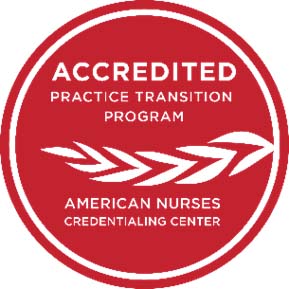
How Cleveland Clinic achieved accreditation
Northeast Ohio hospitals achieved accreditation in 2020 with clinical tracks supporting nurses in medical-surgical, critical care, emergency department, and behavioral health. Cleveland Clinic Florida (2021) and Cleveland Clinic Akron General (2022) followed, with clinical tracks supporting nurses in the medical-surgical, critical care, and emergency care settings.
These sites achieved re-accreditation in 2024, expanding to include clinical tracks in obstetric care, pediatric care, neonatal intensive care, home health, and hospice care.
Cleveland Clinic Martin Health, Indian River, Mercy, Union and Lodi are on the journey to Nurse Residency Program accreditation.
What does it take to achieve residency accreditation?
Research has identified several key factors that support new graduate nurses’ transition to practice. These factors include comprehensive orientation programs, preceptorship and mentorship opportunities, ongoing education, and a supportive work environment. These elements are crucial in helping new graduate nurses build confidence, competence and feel connected and supported in their new roles.
The American Nurses Credentialing Center evaluates Practice Transition Programs to adherence to standards in five domains: program leadership, quality outcomes, organizational enculturation, development and design, and practice-based learning.
Accreditation is a voluntary, peer-review process where hospitals are evaluated against 64 evidence-based standards. It requires an organization’s commitment to professional development and continuous improvement. The rigor of these evidence-based accreditation standards increases every four years, ensuring that healthcare organizations continually enhance their practices and maintain high standards of care.
Achieving accreditation validates that the Cleveland Clinic Nurse Residency Program meets global standards of excellence.
National League for Nursing Center of Excellence in Nursing Education

The National League for Nursing (NLN) Center of Excellence (COE) in Nursing Education certification is a prestigious recognition awarded to nursing schools, healthcare organizations and other educational institutions that demonstrate excellence in specific areas of nursing education. The COE designation acknowledges and promotes exceptional teaching, research and leadership in nursing education.
Cleveland Clinic’s Office of Nursing Education and Professional Development has been designated as a Center of Excellence, reflecting the organization’s commitment to quality education and continuous improvement in the field of nursing education.
The Society for Simulation in Healthcare
Healthcare simulation education is the bridge between classroom learning and real-life clinical experience. It provides nurses, providers, and other healthcare workers with a realistic, safe, and controlled environment to learn and practice clinical skills, teamwork, and communication.
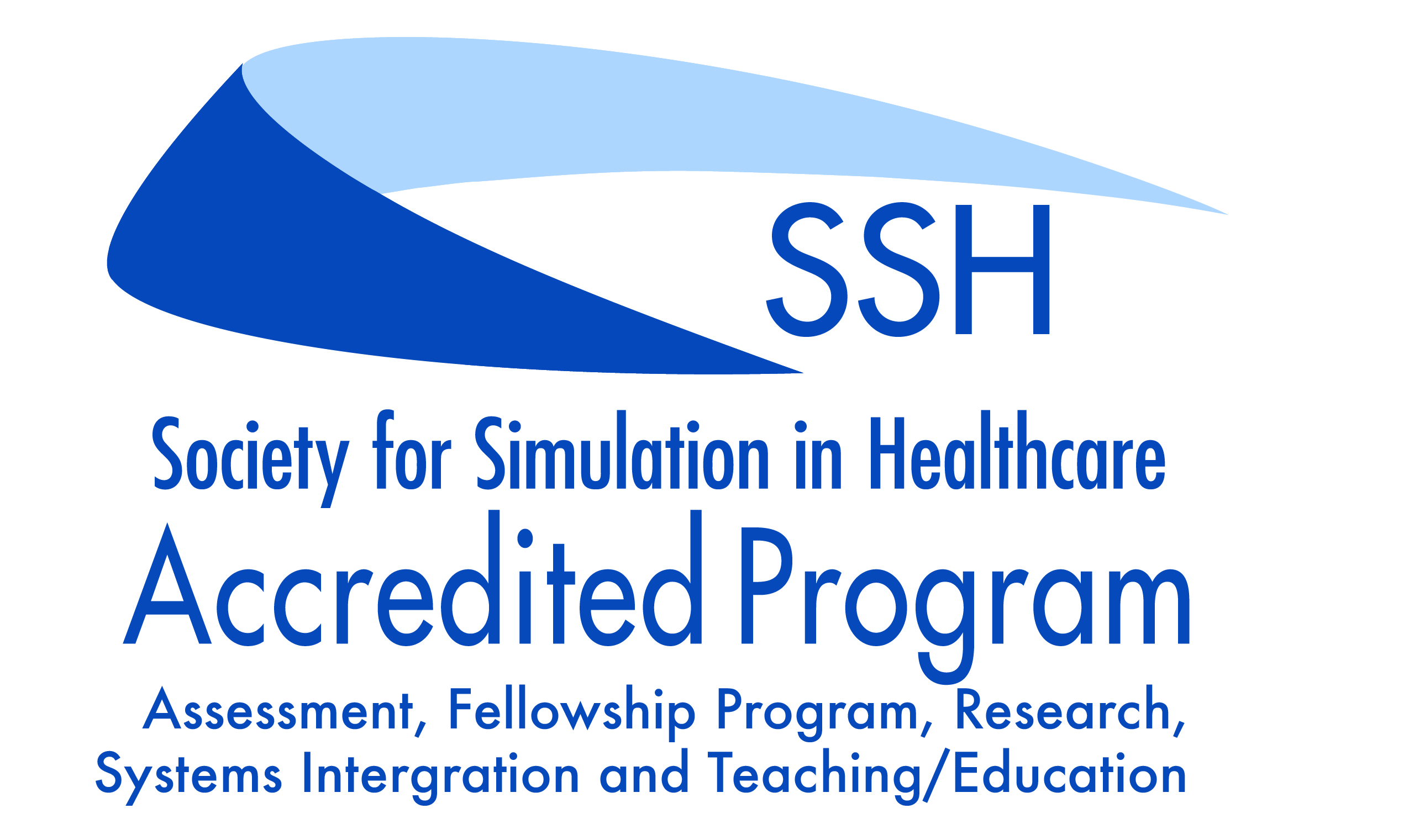
The Society for Simulation in Healthcare (SSH) Accreditation of Healthcare Simulation Programs is considered the gold standard in healthcare simulation. It signifies an organization's commitment to excellence and that they meet all seven core standards and one or more functional area. The core standards are:
- Mission & Governance
- Program Management
- Resource Management
- Human Resources
- Program Improvement
- Integrity
- Expanding the Field
Accredited simulation centers may also apply for recognition in additional, functional areas of simulation. These areas include:
- Assessment
- Research
- Teaching/Education
- Systems Integration
- Fellowship Program
- Human Simulation
Cleveland Clinic's Simulation and Advanced Skills Center achieved initial SSH Accreditation in 2015 and re-accreditation in 2025. The Center maintains accreditation recognized not only for the Core Standards, but for all five functional areas, an accomplishment less than 3% of healthcare organizations worldwide have achieved.
Infusion Nurses Society Seal of Approval
The Vascular Access Resource Nurse (VARN) Program at Cleveland Clinic has been awarded the prestigious Infusion Nurses Society (INS) Seal of Approval. This recognition affirms Cleveland Clinic's commitment to excellence and quality in healthcare.
This program offers Cleveland Clinic nurses education and hands-on experience in vascular access care.
Cleveland Clinic is the first hospital system with a VARN program to receive this award.
We're honored to have met the rigorous standards set by INS, and we're excited to continue delivering premium services to our valued customers. The INS grants the achievement for three years to comply with their updated standards.
For further information, the VARN Team can be contacted at VARNEDU@ccf.org.
